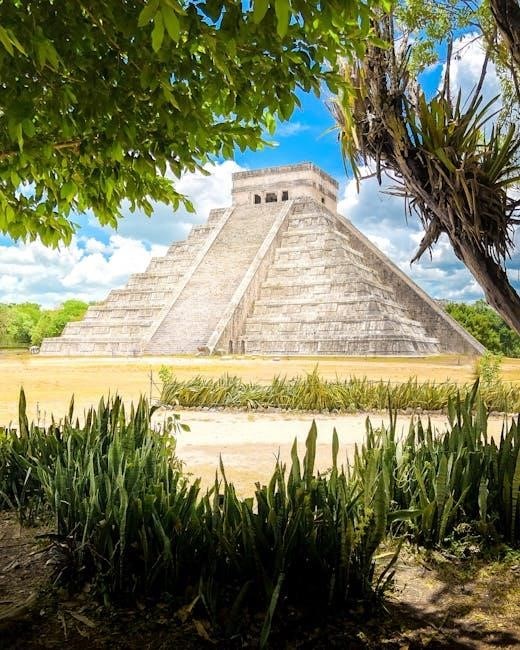the course of mexican history 11th edition pdf free
- Published
- in PDF
This 11th edition provides a comprehensive, engaging survey of Mexico’s history, from pre-Columbian times to the present, offering lively narratives and updated insights for modern scholars․

Overview of the Book’s Significance
The 11th edition of The Course of Mexican History is a leading textbook in its field, praised for its comprehensive and engaging narrative․ It provides an indispensable resource for understanding Mexico’s political, social, and economic evolution, from pre-Columbian times to the 21st century․ This edition is significant for its updated coverage of recent transformations, making it a vital tool for students, scholars, and anyone exploring Mexico’s rich and complex history․ Its lively and accessible style ensures it remains a cornerstone in Mexican studies․
Coverage of Mexican History from Pre-Columbian Times to the Present
The 11th edition spans Mexico’s history from pre-Columbian civilizations to the modern era, offering a detailed chronological and thematic exploration․ It covers key periods, including the colonial era, independence, the Mexican Revolution, and 20th-century modernization․ The book also delves into contemporary issues, providing a thorough understanding of Mexico’s political, social, and economic development․ This comprehensive approach ensures readers gain insights into the nation’s rich and complex heritage, making it an essential resource for studying Mexico’s past and present․

Authors and Publication Details
The Course of Mexican History, 11th Edition, is authored by Susan M․ Deeds, Michael C․ Meyer, and William L․ Sherman, published by Oxford University Press, ISBN 9780190659011․
Susan M․ Deeds, Michael C․ Meyer, and William L․ Sherman
Susan M․ Deeds, Michael C․ Meyer, and William L․ Sherman are renowned historians specializing in Mexican history․ Their collaborative efforts in the 11th edition provide a comprehensive, engaging narrative, blending expertise from pre-Columbian times to contemporary Mexico․ Their work ensures the text remains a leading resource for students and scholars, offering insights into political, social, and economic transformations․ Their contributions have solidified the book’s reputation as an indispensable guide in Mexican studies, reflecting meticulous research and updated interpretations․
Publication by Oxford University Press
Oxford University Press, a prestigious publisher, released the 11th edition of The Course of Mexican History․ With a print ISBN of 9780190659011, it is widely available in both paperback and eBook formats․ Published in November 2017, this edition reflects Oxford’s commitment to quality and scholarship․ The book’s publication ensures accessibility for students and researchers worldwide, maintaining its reputation as a leading textbook in Mexican studies․ Its release highlights the press’s dedication to fostering education and advancing historical knowledge․
ISBN and Edition Details
ISBN-10: 0190659017, ISBN-13: 9780190659011․ The 11th edition of The Course of Mexican History is published by Oxford University Press, ensuring academic rigor and accessibility․ Available in paperback and eBook formats, it remains a trusted resource for scholars and students․ The ISBN details facilitate easy access to the text, making it widely recognized and readily available for educational purposes․ This edition reflects the latest updates in historical research and analysis, solidifying its place as a cornerstone in Mexican studies․

Key Themes and Updates in the 11th Edition
The 11th edition addresses Mexico’s political, social, and economic transformations, includes contemporary issues, and offers new interpretations of historical events, ensuring a comprehensive and engaging narrative․
Revisions Addressing Political, Social, and Economic Transformations
The 11th edition extensively revises content to reflect Mexico’s recent political shifts, societal changes, and economic challenges, incorporating new archival research and updated interpretations of historical events․ These revisions ensure that the narrative remains current and relevant for understanding the nation’s evolving identity and its impact on modern society․ The book provides a balanced perspective on these transformations, offering students and scholars a nuanced understanding of Mexico’s complex development․
Inclusion of Contemporary Issues and Historical Events
The 11th edition incorporates recent historical events and contemporary issues, such as political changes, social movements, and economic shifts, providing a well-rounded perspective on Mexico’s modern experience․ These updates ensure the text remains relevant, offering insights into the nation’s progress and challenges in the 21st century․ This inclusion enriches the narrative, making it a valuable resource for understanding Mexico’s dynamic evolution․
New Interpretations of Mexico’s Past
The 11th edition presents fresh perspectives on Mexico’s history, incorporating new archival research and revisionist interpretations․ These updates challenge traditional narratives, offering deeper insights into key events and cultural shifts․ By examining previously overlooked sources, the authors provide a more nuanced understanding of Mexico’s complex past, making the text a valuable resource for scholars seeking contemporary historical analysis․
Historical Periods Covered
- Pre-Columbian Era
- Colonial Period
- Mexican War of Independence
- 19th Century Developments
- The Mexican Revolution
- 20th Century Modernization
- Contemporary Mexico
Pre-Columbian Era
The 11th edition explores the rich cultural and historical developments of Mexico’s pre-Columbian civilizations, such as the Olmec, Maya, and Aztec empires․ It highlights their advancements in agriculture, architecture, and astronomy, as well as their social and religious systems․ The text provides insights into the diversity of indigenous cultures and their enduring influence on Mexico’s identity․ This section sets the foundation for understanding the complexities of later historical periods, offering a detailed and engaging overview of the region’s early history․
Colonial Period
The 11th edition delves into the transformative colonial period, marked by the Spanish conquest and the imposition of European rule․ It examines the impact of Catholicism, the rise of mestizaje, and the exploitation of indigenous labor․ The text highlights the establishment of colonial institutions, such as the encomienda system, and the economic shifts driven by mining and agriculture․ This section also explores the cultural blending and resistance that shaped Mexico’s identity during this complex era, providing a nuanced understanding of its colonial legacy․
Mexican War of Independence

The 11th edition thoroughly explores the Mexican War of Independence, highlighting key figures like Miguel Hidalgo y Costilla and José María Morelos․ It details the widespread discontent among criollos and the marginalized classes, fueled by political and economic inequalities․ The text recounts pivotal events, such as the Grito de Dolores, and the prolonged struggle against Spanish rule․ This section emphasizes the war’s culmination in 1821 with Mexico’s independence, marking a turning point in its national identity and political trajectory;
19th Century Developments
The 19th century was a transformative period for Mexico, marked by political instability, territorial loss, and social change․ The Mexican-American War resulted in the loss of vast territories, reshaping the nation’s identity․ Liberal reforms, including the Constitution of 1857, aimed to modernize Mexico but faced resistance․ The Porfirio Díaz regime brought stability but also exacerbated inequality․ The century laid the groundwork for the Mexican Revolution, as tensions over land, class, and governance intensified, setting the stage for radical change in the early 20th century․
The Mexican Revolution
The Mexican Revolution (1910–1920) was a pivotal struggle against dictatorship, inequality, and foreign influence․ It began with Madero’s call to overthrow Díaz, sparking widespread rebellion․ Key leaders like Zapata, Villa, and Obregón played crucial roles in shaping its trajectory․ The revolution led to the 1917 Constitution, promoting land reform and labor rights․ It ended with the rise of the PRI, establishing a new political order․ This era remains a defining moment in Mexico’s quest for democracy and social justice, deeply influencing its modern identity and governance․
20th Century Modernization
The 20th century brought profound changes to Mexico, marked by rapid industrialization, urbanization, and technological advancements․ Post-revolutionary reforms aimed at modernizing infrastructure and education, while economic policies fostered growth․ The mid-century saw increased foreign investment and the rise of a middle class․ However, challenges like inequality and political centralization persisted․ This period also witnessed cultural shifts, with modernist movements influencing art and literature․ The 20th century laid the foundation for Mexico’s transition into a modern, globalized nation, balancing tradition with progress․
Contemporary Mexico
Contemporary Mexico navigates a complex landscape of political, social, and economic challenges․ The 21st century has brought significant transformations, including globalization, technological advancements, and shifting cultural identities․ The 11th edition explores recent events, such as NAFTA’s impact, migration patterns, and the rise of democratic reforms․ It also addresses ongoing issues like inequality, drug violence, and environmental concerns․ This section provides a nuanced understanding of Mexico’s modern identity and its role in the global community, highlighting both progress and persistent challenges․
Pedagogical Features
The 11th edition offers contextual introductions, key terms, and engaging narratives, ensuring a student-friendly approach to understanding Mexico’s rich history from pre-Columbian times to the present․
The 11th edition features contextual introductions for each chapter, providing students with a clear framework to understand the historical significance of each period․ These introductions set the stage by highlighting key themes, events, and cultural shifts, making complex topics more accessible․ By offering a concise overview, they help students engage deeply with the material, fostering a better understanding of Mexico’s transformation from pre-Columbian times to the modern era․ This approach ensures a seamless learning experience, enriched by the authors’ expertise and insights․
Key Terms and Related Sources
The 11th edition includes key terms and related sources, enhancing student engagement and research․ Each chapter lists essential terms, providing definitions and context, while related sources offer primary documents, scholarly articles, and multimedia resources․ These features enable students to explore topics in-depth, fostering critical thinking and analysis․ By integrating these elements, the textbook ensures a well-rounded understanding of Mexico’s history, making it an invaluable resource for both students and scholars alike․ This approach enriches the learning experience and supports academic success․
Engaging Survey for Students
The 11th edition offers an engaging survey designed to captivate students with a narrative that balances depth and accessibility․ It covers pre-Columbian times to modern Mexico, ensuring a comprehensive understanding․ By integrating lively narratives and updated insights, the textbook makes complex historical events relatable․ This approach encourages active learning, sparking interest in Mexico’s rich cultural, political, and social evolution․ The engaging survey is tailored to meet the needs of undergraduate students, making it an essential tool for academic success in Mexican history courses․
Target Audience
Ideal for students and scholars of Mexican history, politics, and culture, it is essential for academic courses and a valuable resource for researchers․
Students of Mexican History, Politics, and Culture
The 11th edition caters to students seeking a detailed understanding of Mexico’s past and present․ It covers pre-Columbian times to contemporary issues, offering insights into political, social, and economic developments․ The textbook’s engaging narrative and updated content make it an essential resource for those studying Mexican history, politics, and culture․ Additionally, it provides key terms, contextual introductions, and related sources, enhancing learning and research for students at various academic levels․

Use in Academic Courses
The 11th edition is widely adopted as a primary textbook in Mexican History courses, offering a structured and engaging narrative for undergraduate and graduate students․ Its comprehensive coverage aligns with academic curricula, making it ideal for courses focusing on Latin American Studies, History, and Political Science․ The inclusion of key terms, contextual introductions, and updated sources enhances its utility in classroom settings, providing students with a robust framework for understanding Mexico’s complex past and contemporary challenges․
Relevance for Scholars and Researchers
The 11th edition serves as an essential resource for scholars and researchers, offering a comprehensive and updated analysis of Mexico’s history․ It incorporates new archival research and revisionist interpretations, making it a valuable tool for deeper academic exploration․ The book’s lively narrative and rigorous scholarship ensure its relevance for advanced studies, while its coverage of contemporary issues provides fresh insights for researchers focusing on modern Mexico․

Significance of the 11th Edition
The 11th edition is a comprehensive update, offering a lively narrative and fresh insights into Mexico’s history, making it an indispensable resource for modern scholars․

Comprehensive Update for the 21st Century
The 11th edition of The Course of Mexican History has been thoroughly revised to reflect Mexico’s political, social, and economic transformations in the 21st century․ This update ensures the text remains relevant and current, addressing recent historical events and contemporary issues․ The inclusion of new archival research and revisionist interpretations provides a fresh perspective on Mexico’s past, making it an essential resource for students and scholars studying Mexican history in a modern context․

Lively and Engaging Narrative
The 11th edition of The Course of Mexican History is renowned for its lively and engaging narrative, making Mexico’s rich history accessible and captivating for students․ The text seamlessly weaves together stories from pre-Columbian times to the present, ensuring a dynamic and immersive learning experience․ This engaging approach helps students connect with historical events, fostering a deeper understanding of Mexico’s cultural, political, and social evolution over the centuries․
Indispensable Resource for Mexican Studies
The Course of Mexican History, 11th Edition, stands as an indispensable resource for scholars and students, offering a comprehensive and updated exploration of Mexico’s past․ Its detailed coverage of historical events, cultural shifts, and contemporary issues makes it a primary source for understanding Mexico’s evolution․ The book’s engaging narrative and thorough research ensure its relevance for academic pursuits, solidifying its position as a cornerstone in Mexican studies and a must-have for anyone exploring the nation’s rich and complex history․

Accessing the 11th Edition
The 11th edition is accessible in print and eBook formats, available on major online platforms, with options for free PDF downloads, ensuring wide accessibility․
Print and eBook Formats
The 11th edition of “The Course of Mexican History” is available in both print and eBook formats, offering flexibility for readers․ The print version, published by Oxford University Press, features a paperback edition with 672 pages, ideal for classroom use․ The eBook version provides a convenient digital option for students and researchers․ Both formats include the same comprehensive content, ensuring accessibility for a wide audience․ The book’s engaging narrative and detailed historical insights make it a valuable resource in either format․
Availability on Online Platforms
The 11th edition of “The Course of Mexican History” is widely available on online platforms, including Amazon, Oxford University Press’s official website, and major eBook retailers․ Students and researchers can easily access the digital version through these platforms, ensuring convenience and flexibility․ The eBook format is particularly popular for its portability and accessibility, making it a preferred choice for academic use․ Online availability has significantly enhanced the book’s reach, catering to a global audience interested in Mexican history and culture․
Free PDF Download Options
The 11th edition of “The Course of Mexican History” is available as a free PDF download through various online platforms, including academic repositories and eBook-sharing sites․ However, users are advised to ensure they are accessing the material legally and ethically․ Some websites offer free downloads, but verifying the source’s legitimacy is crucial to avoid copyright infringement․ Additionally, many universities and libraries provide free access to the PDF through their databases, making it a convenient option for students and researchers․
The 11th edition of “The Course of Mexican History” is a leading textbook, offering a comprehensive and engaging exploration of Mexico’s past, essential for students and scholars alike․
Final Thoughts on the Book’s Importance
The 11th edition of “The Course of Mexican History” stands as a vital resource for understanding Mexico’s complex past and its modern transformations․ Updated with fresh insights, it captures the nation’s political, social, and economic evolution, making it indispensable for scholars and students․ Its engaging narrative and comprehensive coverage ensure a deeper understanding of Mexico’s role in global history․ This edition remains a cornerstone for academic studies, offering unparalleled depth and relevance in the field of Mexican history and culture․
Recommendation for Students and Scholars
The 11th edition of “The Course of Mexican History” is a must-have resource for students and scholars of Mexican studies․ It provides a comprehensive, up-to-date examination of Mexico’s history, blending lively narratives with rigorous scholarship․ Ideal for academic courses, it equips learners with essential insights into the nation’s political, social, and cultural evolution․ Scholars will appreciate its updated interpretations and detailed coverage, making it an indispensable tool for both undergraduate studies and advanced research in Mexican history and related fields․
